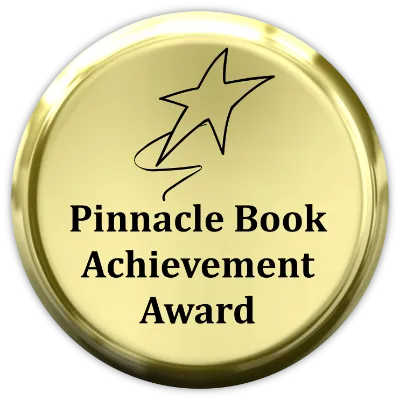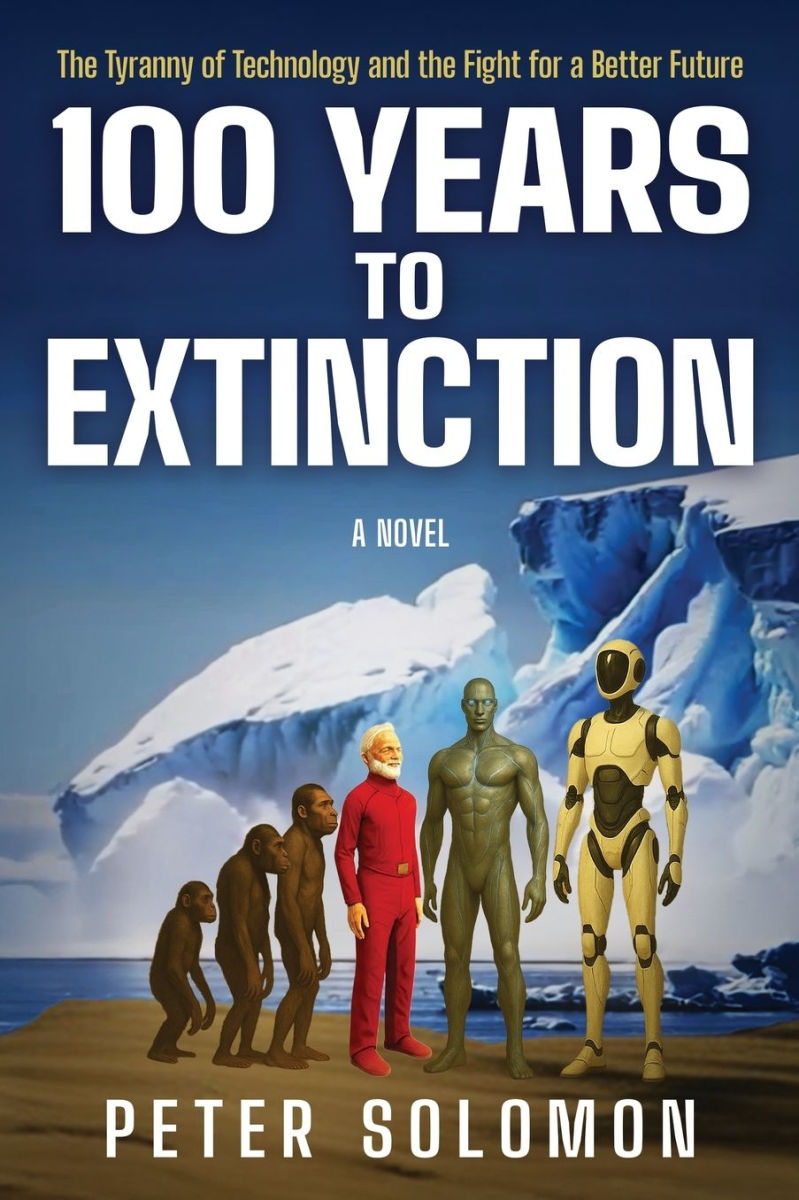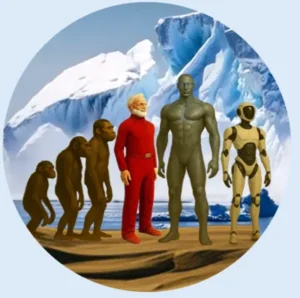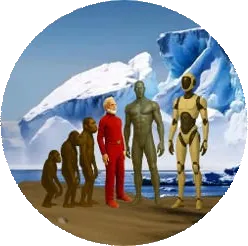100 Years to Extinction
The Tyranny of Technology and the Fight for a Better Future







NOW AVAILABLE ON AMAZON, BARNES AND NOBLE, AND OTHER BOOK OUTLETS

SCIENCE FICTION | AI | ENVIRONMENT | GENETIC ENGINEERING
100 YEARS TO EXTINCTION
The Tyranny of Technology and the Fight for a Better Future
Peter Solomon, PhD
What if Stephen Hawking was right—and we have less than a century to avoid human extinction?
With characters who feel heartbreakingly real and science that hits close to home, 100 Years to Extinction is both a wake-up call and a rallying cry. It dares readers to imagine a better future and to fight for it.
When EMT Liz Arvad is shot while saving a life, her recovery sparks a deep awakening: maybe the world isn’t just chaotic—it’s unraveling. Her genius sister, Aster, quotes Hawking’s warning that humans could become extinct on Planet Earth by 2117, while their politically savvy cousin, Milo, sees democracy crumbling. Together, they vow to act, starting with a promise in a sunlit room that grows into missions that could change the future of the world.
 Will you join the Earthling Tribe to Make Earth Great Again? Get your copy of 100 Years to Extinction—and discover what you can do before time runs out.
Will you join the Earthling Tribe to Make Earth Great Again? Get your copy of 100 Years to Extinction—and discover what you can do before time runs out.
Blending heart-pounding fiction with clear, accessible science, physicist and award-winning STEM author Peter Solomon, PhD, explores the runaway threats we can no longer ignore—climate collapse, pandemics, nuclear war, genetic engineering, artificial intelligence, disinformation, and more. Solomon offers unmatched clarity on the question: Can we still save ourselves, and how might we do it?
1
SHE CAN’T DIE
Aster Arvad, 2022
“I am not going to die, I am going home like a shooting star.”
— Sojourner Truth, American abolitionist
https://www.legacyproject.org/activities/clubtruth.html
“How could this happen?”
— Aster Arvad’s Snappost – #Sisters
I’m falling asleep, but I want to see Interstellar, the movie my boyfriend was just raving about on the phone. The story was about finding a new planet to save humanity from extinction on an increasingly inhospitable Earth. I don’t get to sleep ’til after midnight, not good when I have a paper due tomorrow for Introduction to Astronomy.
The shrill ringing of a phone jars me awake. I swipe my phone but the ringing continues. What? It’s the landline in Dad’s office? At 3:17? Should I answer? It keeps ringing. Half asleep, I stagger into the office, grab the handset, but don’t say anything.
“Hello? Anyone there? This is Sgt. Samuels from the Glenfield Police Department. Is this the residence of Elizabeth Arvad?”
The police? A cold chill seizes me. “Lizzie? Is she okay? I’m her sister.”
“Are your parents at home?”
“Just a minute.”
Omigod! I race down the hall, pound on my parents’ door, and burst into their room. “Mom! Dad! Wake up! Something’s happened to Lizzy!”
Dad rubs his eyes, sits up, and grabs the phone. He identifies himself, listens for several minutes, biting his lip, and says, “City hospital? We’re on our way.”
“What happened?” I know it’s bad.
“Get some clothes on fast!” he gasps, his tone fueling my fear. “We’ve got to get to the hospital!”
Five minutes later, Dad backs out of the driveway, his body rigid, both hands clutching the steering wheel. My usually obsessively neat and stylish mom, sitting in front, is a bedraggled mess. I’m in the back. “Dad, what happened!”
As we speed down our dark street, Dad delivers the terrible news. “Liz has been shot! She’s going into surgery.”
Vivid images of my sister crumpled on the ground, her EMT uniform stained with blood, flash through my brain. Choking back tears, I ask, “How did she get shot? Is she going to be okay?”
Dad explains, his voice faltering, “Samuels, the officer who just called, said he was radioed by the 911 emergency center. A man in Glenfield reported that his elderly father was having a heart attack. Samuels dispatched a police car and the ambulance with Liz and her EMT partner, Anton Renard. Liz was shot when she got out of the ambulance at the man’s house. Renard administered first aid and got her on the Life Star helicopter. Samuels had no information about her condition.”
Mom sobs.
I’m crying, my head pressed against the cold car window. What if she…? Will our last words be the argument we had just before she left for her late shift? She came into our room and was about to tell me something when she noticed I was wearing one of her favorite tank tops.
“Aster, I’m going to tear you apart if you don’t take that off!” she yelled. “Now!”
“Lighten up, Lizard,” I responded. “You always look like you just came home from your best friend’s funeral. What about all the stuff you borrow from me?”
Grandpa dubbed us the barbarians based on our constant squabbling.
Lizzy stormed out of the room and left the house. The thought that this might be our last conversation crushes me. Will I ever find out what she was about to tell me? I start to cry.
The drive to the hospital is taking forever. I try to picture happier memories with my indestructible sister, older by four years. I recall Lizzy singing to quiet my anxiety as she braids my hair in pigtails for my first day of kindergarten. I remember warm summer nights in the dark backyard, feeling safe as Lizzy holds my hand while we gaze at the millions of stars I love. She doesn’t laugh when I tell her how I want to visit them when I grow up. She says, “We’ll go together.” I look at the stars out the car window and I still want to visit them, but it has to be with her. She has to be okay.
I hear Mom ask, “Who shot her?”
Dad responds, his voice cracking, “Renard told Samuels that when they arrived at the house and jumped out of the ambulance, a man appeared on the porch. He fired a gun, and Liz was hit in the chest. The police arrived seconds later and exchanged fire with the shooter. He was wounded and then arrested.”
I tune out Mom and Dad as I remember the strong bond Lizzy and I formed when we were in middle school. I’m jerked back to the present when I see the tall buildings of the city and realize we’re getting close to the hospital. Dad drives through the deserted streets to the vast, white-brick building that is brightly lit and screeches to a stop in front of the entrance.
Mom and I get out of the car, put on face masks, and I follow her like a zombie into the deserted hospital lobby. It’s silent except for our footsteps on the tiles and my whimpering. The place holds horrible memories from several years ago when I visited Papa and Mimi, my Mom’s parents, before they passed away two years apart.
At the reception desk, a masked security guard issues us name tags and directs us to the fifth floor. He advises us to keep our masks on, as they are highly recommended but no longer mandatory.
As we wait for Dad, my mind keeps repeating, I can’t lose her, I just can’t. I think of what my big sister means to me: how she protects me, how she encourages me, how she puts up with my odd, quirky, misfit, geeky behavior, and how she makes me laugh. She’s my role model for the woman I want to be.
Dad arrives and tries to comfort us. “Liz is a strong girl. She’ll pull through.” I think he’s managing a smile behind his mask.
Dad gets his name tag, and the three of us take the elevator to the fifth floor and check in at the nurses’ station. A nurse sends us down the hall where we find uncomfortable chairs in the sterile visitors’ room and anxiously await the report on Lizzy’s condition. We follow the security guard’s advice and keep our masks on.
Mom is in her pajamas covered by a raincoat, her long, graying blond hair a mess. Dad has his eyes closed, his brow furrowed, and his lips pressed into a thin line. The silence is interrupted by occasional sounds of shuffling footsteps in the hall and periodic announcements. We stare blankly at each other. Characters in a horror movie.
“Why would someone shoot Liz?” asks Mom.
“Not clear,” Dad responds, opening his eyes. “Renard told Samuels that the man yelled ‘Nazi quacks’ just before he opened fire.”
Mom leans over and puts her arm around me, and I start straightening her tangled hair. She’s crying. Dad puts his arm around us and starts crying, too.
As the sky brightens, a tall woman in green scrubs, wearing a mask, enters the room. We jump up to meet her.
“I’m Dr. Sherman,” she says. “I performed your daughter’s surgery.”
I hold my breath, and my heart races as I pray for good news.
“Her wound was on the right side of her upper chest. The bullet passed through her right lung and shattered a rib, but it missed her heart and major blood vessels. She received a blood transfusion. We removed the bullet and repaired the lung, rib, and blood vessels. She sustained a large amount of bleeding into the lung and remains in critical condition.”
Her words aren’t the lifeline I hoped would rescue us from our sea of dread. Tears fill my eyes and run down my cheeks.
Dad asks, “What happens now?”
“She is in an induced coma to give her body time to heal. She may not regain consciousness today or even for the next few days. When she’s out of recovery, she will be transferred to the ICU unit. You may visit her there. Even though she cannot respond, she may hear you and feel your touch, so talk softly to her and hold her hand.”
“Thank you, Dr. Sherman,” Mom says, her voice cracking.
The doctor excuses herself, we sit down, and I stare at the wall. Dad calls his parents to tell them what happened. Then we wait.
An hour later, my grandparents arrive. Both in their eighties with white hair, they are trim and active. Dad fills them in on what we know.
“Unbelievable!” exclaims Grandpa, his head shaking and his hands raised in disbelief. “This monster shoots a random first responder who comes to save his father? It doesn’t make any sense!”
“What’s happening to make people so crazy?” asks Grandma.
We sit, talk about the horrible incident, recall happier memories, and try to stay optimistic. Lunch in the cafeteria is crappy. I buy a deck of cards in the gift shop and play gin rummy with Grandma. Dinner at a local restaurant is much better.
At the end of the day, Liz remains in a coma. My grandparents and I leave the hospital at eight o’clock. Mom and Dad stay until midnight.
The next morning, the story of the shooting is in the news. It describes the incident, gives the name of the shooter, and reports that he was an employee of a local nursing home. But there isn’t any information about his motive.
There’s no movement from my parents’ bedroom. Quietly leaving the house, I drive to Glenfield and find the Victorian house marked by yellow crime scene tape. Liz’s ambulance is still in the driveway. I sit for a while, looking at the house, and drive home crying.
My parents wake up, but I don’t tell them about my visit. We eat breakfast and return to the hospital.
My sister’s condition remains unchanged. We each get a short visit with her. When it’s my turn, I rub her hand and talk about the day she terrified my playground bullies.
At 10 a.m., a police officer enters the waiting room as sunlight slants through the windows, painting the walls in bright patches. We stand as he introduces himself as Sergeant Samuels. I had pictured him as a large, powerful man, but he’s only slightly taller than me, thin, old, and balding.
“How’s Elizabeth doing?” he asks. “Her EMT partner and the officers who were at the scene are concerned. I offered to come see for myself and report back.”
“Thank you.” Dad tells the sergeant what the doctor reported and adds, “Liz is a strong girl, so we’re confident she’ll recover. Please thank your fellow officers for stopping the shooter before he could cause more damage.”
The sergeant says he’ll pass on the message, and Dad asks, “Is there any information to explain why this guy shot my daughter?”
Samuels replies, “There was no one at the scene having a heart attack. It was apparently a ruse to get the first responders to the house. We have no information yet as to the reason.”
“I don’t understand,” says Dad in a faltering voice that reveals his frustration. “What gives this madman the right to shoot our daughter? People have been acting crazy for the last two years, ever since this pandemic started. And this lunatic with a gun decides to shoot someone who is doing her best to save lives. I was so proud of our Lizzy for doing a crucial job. Now it seems it’s a dangerous job. I just don’t understand.”
Liz’s condition remains the same throughout the second day.
On the ride home, my mind keeps returning to the lingering question: why did this horrible monster lure her to his house? Liz was a biology major, attending college remotely because of the pandemic. To escape the house, she trained to be an EMT and got a job. During her first six months, she pulled a dead body out of a car submerged in a lake and responded to a school shooting. Last fall, she restarted the heart of a high school football player who collapsed on the field. She’s a real hero. Why shoot an emergency responder who came to save someone’s life?

